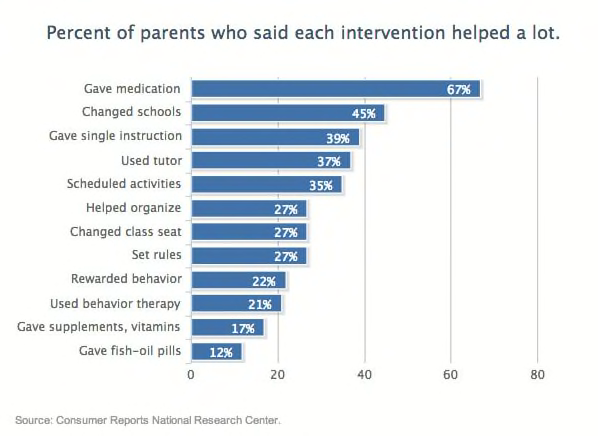Sign In


Whether or not you decide to use medications, there are many strategies that parents in our survey found helpful. Having a child change to a school better suited to help with attention deficit hyperactivity disorder helped "a lot" (45 percent), as did giving one instruction at a time (39 percent), having a private tutor or learning specialist work with the child (37 percent), and providing structure by maintaining a schedule of activities (35 percent).
Although having a child take medication was the strategy most often indicated as helping "a lot" (67 percent), (see Drug treatment: Pros and cons) many other strategies were also worth the extra effort.

Four of the top five strategies were forms of extra attention for the child, suggesting that day-to-day assistance with skill building is important for a child's success. Many parents tried multiple strategies. One of the more helpful strategies was working with a tutor or learning specialist.
"The best approach is to provide a comprehensive strategy," says Martin L. Kutscher, M.D., a child neurologist in Rye Brook, N.Y., with more than 20 years of experience diagnosing and treating families affected by ADHD. "Often, medications are required to allow the behavioral approaches to work. You can give the child the equivalent of bicycle brakes with medication and then teach him/her to use those brakes."
Some techniques were more helpful for younger children, up to age 11, than for those 12 and older. Having a private tutor or learning specialist work with the child and setting up and enforcing a reward program were particularly helpful for younger children but still helpful for those 12 and older. That suggests that for best results tutoring should begin before age 12.
Most of the children in our survey attended public school (80 percent), and 72 percent of those parents requested an individualized education program or specific accommodations to provide a better learning environment for their child. Only 11 percent received accommodations and found them unhelpful. Fourteen percent of parents sought accommodations for their child at school and were turned down, which is unfortunate because 75 percent of parents found accommodations at least somewhat helpful for their children.
| Parent-rated helpfulness of accommodations (among those whose children attend public school and who requested accommodations) | |
|---|---|
| My child receives accommodations and they are VERY helpful | 40% |
| My child receives accommodations and they are SOMEWHAT helpful | 35 |
| My child receives accommodations but they are NOT VERY helpful | 11 |
| The school was not willing to make accommodations | 14 |
Source: Consumer Reports National Research Center.
Concerns about stigma and privacy might make some parents of children with ADHD worry about asking for accommodations for their children at school. Parents might also be worried about the request going on the child's permanent record. But for a child to succeed at his or her optimum ability level, it's important that the school environment be as customized as possible. Here's how you can go about receiving accommodations from your child's school:
Step 1: Contact the school
Start out by sending a letter to your child's school requesting an evaluation to determine whether your child would benefit from accommodations. The letter should be sent directly to the person in charge of special-education services. You can also send a copy of the letter to your child's teacher or notify him or her that you are interested in pursuing accommodations.
If the school does not agree to perform the assessment, you have the option of pursuing one by an outside professional. In some cases the school might be responsible for reimbursing you.
Step 2: Prepare for the evaluation
Once the school has determined your child's eligibility for an assessment, you will either meet with the school's assessment team, or if the school has declined the assessment, an outside professional.
When you meet with the assessment team, take all available relevant materials. Include items such as medical records, previous testing results, and report cards.
Most children with ADHD have mild symptoms and do not need medication, says Michael L. Goldstein, M.D., a child neurologist in Salt Lake City and a former vice president of the American Academy of Neurology. "Many children and families have developed good strategies on their own so that symptoms do not cause distress to the child," he says.
When implementing a nonmedication strategy, he says, "Parents should remember that ADHD is a disorder that decreases the child's ability to do what they want to do. Increasing punishment doesn't work for ADHD symptoms. Some behaviors may be deliberate misbehaviors that may require discipline, but most ADHD impulsiveness and inattention is not intentional and will not improve with discipline." What does work is "understanding what the child can do and changing the adults' expectations to closer align with the child's abilities. 'Now' is always the best time to initiate nonmedication strategies."
Following are nonmedication strategies from child neurologist Kutscher that you can use anywhere to help you and your child cope with ADHD:
 WASHING MACHINE REVIEWS
WASHING MACHINE REVIEWS GENERATOR REVIEWS
GENERATOR REVIEWS
 Build & Buy Car Buying Service
Build & Buy Car Buying Service
Save thousands off MSRP with upfront dealer pricing information and a transparent car buying experience.
 Get Ratings on the go and compare
Get Ratings on the go and compare
while you shop